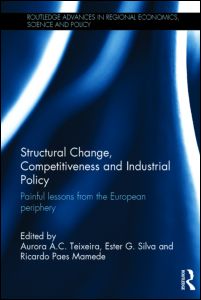Giannitsis T., I. Kastelli, 2014, “Industrial policy in times of crisis: the case of Greece” in Teixeira Α.Α.C., E. Silva, R. Paes Mamede (eds.), Structural Change, Competitiveness and Industrial Policy: Painful Lessons from the European Periphery, Routledge, Taylor & Francis Group, London and New York.
Synopsis
Chapter 11 addresses the role of industrial policy in the process of overcoming the economic crisis in Greece. The rationale of such a policy is based on the hypothesis that without targeted policies, imbalances will further deepen the crisis and prolong the structural barriers to growth.
Liberal policies failed to enhance the production base and capabilities with a crucial impact on the extent, the duration and the implications of the crisis. To deal with the present situation industrial policy on the one hand has to tackle the structural determinants of the crisis but on the other hand it has to address the adverse structural consequences of the crisis and the erroneous policy decisions during the crisis. However the success of such a policy does not depend solely on national choices but is co-determined by European anti-crisis policies. To continue as in the past will deepen imbalances and result to further social and political destabilization.
Relevant posts:
- Wolff, Β. G. (2014) “Why Juncker’s industrial goals are unlikely to be achieved“, Bruegel Institute, 16 July.
- Eurofound (2014) “Industrial relations in central public administration: Recent trends and features – Executive summary“, Publications, European Foundation for the Improvement of Living and Working Conditions, July.
- European Commission (2013) “Member States’ Competitiveness Performance and Implementation of EU Industrial Policy report 2013“, European Commission, 25 September.




